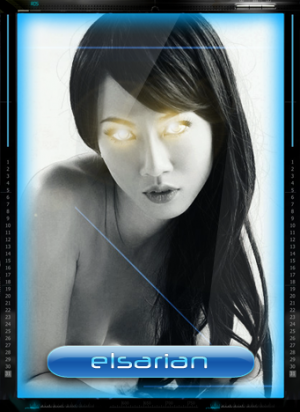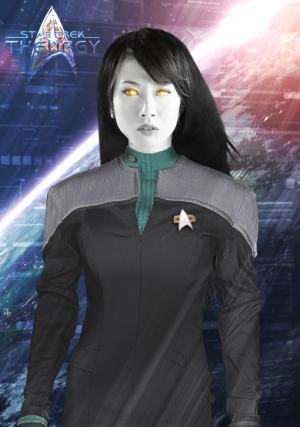Elsarian
From Star Trek: Theurgy Wiki
A dark planet, drifting silently slowly through the vastness of space not far from the beautiful planet of Betazed was home to an odd culture. A race devoid of color, where the only heat known came from fissures of steam deep underground and the only light was the vast ocean of stars overhead.
This was the planet Elsaria and on it lived the people known as the Elsarian. A mostly peaceful race that was a longtime member of the Federation, seldom did members of the race travel to the far to bright worlds of the gleaming outside.
The Elsarian people had a legend that they were once people from another world, taken from that one and abandoned on this world. What truth their is to this is unknown, but it is highly unlikely that they evolved naturally on the planet as were are no other primate lifeforms on the planet.
Physiology
Living in such dark conditions and evolving in them caused the Elsarian people to eventually lose all pigment in their body. The result was a stark white skin that, in even low light, stood out from the darkness very well, allowing them to see each other even by only the starlight that bathed their planet.
Their blood was carbon based and gray, which caused areas like the mouth, internal organs, and genitals to be a darker shade of white than the rest of the body. Their blood was also less viscous than most humanoids, allowing them to have lower blood pressure and narrower arteries and veins to compensate and prevent blood loss.
They had heavier deposits of carbon in their fingernails and hair resulting in those areas being both black and much tougher than the average humanoids, though not enough to provide much more protection. It was common for the hair to be straight and long, and nails to be kept short.
Due to heavy deposits of copper and gold in the iris and retina, the areas were highly reflective and allowed for the ease of control of how much light the eye was exposed to. For those willing to learn to adapt, learning to live on a planet with a star could take one to three months depending on regular exposures and light levels. This also means, when seen out and about on a starship or planet with more traditional levels of solar activity, their eyes seemed to shine with a light all their own in a unique, reddish-golden hue.
In addition, due to spending much of their lives near steam vents, most Elsarians enjoyed exposure to steam and when off-world actively sought it out.
Being native to a planet with no star, Elsarians had no digestive enzymes that allowed them to eat plant matter, instead they ate a unique bacteria and fungi rich paste collected in the steam vents and meat from the unique species of long worm that fed on the paste, as well as larger predators that fed on the worms. It was not a cuisine that many other species found appetizing, however it was nutrient rich and their palate evolved to find it quite enjoyable. They demonstrated that, with some additional digestive enzymes, they could eat meats from other worlds. However, finding the correct level of enzymes to allow them to eat plant matter proved difficult.
Being a species with two genders and exhibiting sexually dimorphic characteristics, males and females developed differently in their lifetimes. As in most humanoids, males were taller and developed more muscle mass while females developed additional body fat and had wider hips.
Unlike other humanoid species, however, the males had a larger scrotum which housed an additional set of testes. Females likewise had a second set of ovaries. As with many known species, males produced sperm, albeit more of it; and females produced eggs, though they tended to release them two at a time. The result was many pregnancies began as a set of fraternal twins until one was absorbed by the other. It was believed the produces a much stronger genetic code in the offspring, though the exact cause was unknown. One of the results, however, was that females of the species had a much higher level of a hormone similar in structure to oxytocin and serotonin. The full effects of the hormone were unknown, though it fostered a calmer personality type. Due to the reproductive differences and other biological differences, cross species reproduction was believed to be impossible, even with the race believed to be their closest cousin, the Betazoids.
Like some other races Elsarians were capable of a limited form of Telepathy through touch. This connection was caused by the strong number of unique neuroreceptors on the skin. This detected much more than simple variations in temperature and pressure, but rather had the ability to temporarily form links between the central nervous systems of similar creatures. The full extent of such abilities in working with other races was unknown due to biological differences, however some preliminary testing showed it could be similar to the Vulcan "Mind Meld." This created a strong desire to connect with other beings through touch, and touch was viewed as both a socially acceptable and public intimate act that could even be shared with strangers.
Psychology
Due to lives in relative darkness the Elsarian people viewed the cosmos differently from most. Touch became a key concept in their world, an intimacy that was shared with both strangers and with lovers. To them, a world where you did not reach out and make physical contact, even briefly when you passed someone on the street was an unnatural one. Add to that their unique telepathic abilities which were dependent upon touch and you had a society which was very open with a great many things.
Yet due to biology, their were some differences between males and females in the race. Males, with their extra set of testes, had an increase in a hormone akin to testosterone. While it did not make them as aggressive as it seemed to make other humanoids, it did make them more competitive which added to the desire to earn status. Females, on the other hand, had higher levels of a unique hormones similar in structure to both oxytocin and serotonin which made them much calmer and more nurturing.
Language
The Elsarian Language was not overly complex by most standards, being phonetically not much different from the Earth Language hanguk-eo, the native language of the people of Korea. It had a simple logical structure, easy for most off-worlders to learn, however many did not.
The writing system had more in common with Earth's Braille, though it used angular shapes to convey meaning rather than dots. The writing was clearly descended from a pictographic form, implying that at one time the people were more vision-based.
Home World
Elsaria was a rogue planet drifting slowly through space in the same sector as Betazed. Though it was roughly Earth sized, it had a slightly thicker atmosphere and is covered in volcanic fissures which released stream from its molten core and liquid water mantle.
It had a number of large cities built around the large cracks in the ground from which it generated most of its food and power. It built up a decent amount of trade around its unique fabrics and other goods made organically from the paste of the fungi and bacteria they cultivated in the steam vents. It was also proven to be a relaxing place to stay for those who enjoyed stargazing while not enjoying the feel of artificial gravity. The locals seemed more than happy to cater to tourists, as long as local light level laws were abided by.
Culture & Customs
Being a planet of darkness, much of the culture and customs of the planet were more tactile than other places. Art was viewed through texture and pattern in the feel of fabric. Clothing was woven from the long strands of the unique bacteria and fungi chains that grew in the steam vents and a feeling somewhere between fine leather and canvas, as a result, were unlike fabric found anywhere else in the galaxy, even if they were not overly colorful.
Like many races, they developed a variety of musical tastes, though each had a unique droning quality, single songs lasted closer to half an hour so that often a band performed a single song at a festival or a handful at a concert. The sound was said to be something of the hum in the darkness with only the glimmer of melody to hold it together. Some called it hypnotizing, others were less kind.
On the street, it was common to make physical contact with practically everyone who knew you, not doing so was considered borderline rude. However, some exceptions were made for less tactile races.
The food was often not heavily spiced as the only spices used were of the mineral variety, such as forms of salt. To those not accustomed to the food, it was not regarded as very appetizing so numerous replimats set up in many of the cities, though their setting were tweaked so they produced much less light.
History
Before a certain point in history, it was as if the Elsarian people did not exist, having no written record and no history. In those early days, the Elsarians were not adapted to the low light and many died. Eons and evolution changed them, leaving only traceable evidence back to those early days.
The cradle of Elsarian civilization proved to be the massive steam vents that littered the planet like great cracks in the ground. There, food in the form of bacteria and fungi were found. At first it was a simple matter of gathering the bacteria and fungi-rich paste and hunting for the worms and various other creatures that ate the fungi and bacteria for food and weaving the gathered long strands of fungi for clothing, but as the ages passed, the Elsarians learned to cultivate the natural resources, allowing them to remain in places long enough to build villages and permanent residences in the jagged rock.
Early tools made of stone were replaced by tools made of metals found in the vents. The deep parts of the vents produced a form of natural steel and it was the discovery of that which plunged the Elsarians into the Iron age and beyond.
Fire itself proved difficult as its bright light proved painful to look at and there were many other sources of heat. However, as time moved on, it became necessary to create stronger materials that could handle the high heat deep in the vents and not grow weak, so experiments were done and in time progress was made, even if it was slow.
The Elsarians had an advantage in their evolutionary process—their distance from neighboring groups. The vents were far enough spaced out that tribal warfare was not possible in the early days of their evolution, so they never developed along those lines. Thus, they didn’t develop militaristically until much later.
Their culture and civilization developed as time went on, mechanization and industrialization taking ahold in due time. Cities grew around. The steam vents and the never ending march of progress continued.
At some point, technology allowed for the observation and exploration of space. That led to the discovery of worlds around those stars they saw in the sky, of places of light unlike anything they had seen before. They pushed further and further, every year pushing deeper into space before returning to their dark world.
And then it happened. One day, a ship built as an experiment broke a barrier that, for eons, they had not even know existed. It fell behind them. In an instant, it seemed as if the whole of the galaxy opened up to them, even if it was still much too massive to really do much.
In the years that followed, scout ships were built and then trade ships. Planets were found and for the first time in recorded history, an Elsarian stood on a planet under the light of a sun.
They had a sister planet in the nearby world of Betazed and found many commonalities with its people. It was not uncommon in those early days of trade for Betazoids to find themselves staying for long periods on Elsaria and for Elsarians to find themselves on Betazed. The two cultures, though different in many ways, found enough common ground to allow for that first time to be peaceful and cooperative.
When the time came, both planets joined the United Federation of Planets. Although, because of Elsaria's unique galactic geography, a special treaty had to be made. After all, very few rogue planets were shown to even have life, let alone life that developed far enough to develop warp technology.
Years passed and things changed, new alliances were formed, new trades routes made, yet for many the safety and darkness of Elsaria was all they could ever want or need. Only for a few did the galaxy call.
Government & Military
Elsaria was governed by the Council of 10, the five elected leaders of the five largest cities and the five elected leaders of the various other areas of the inhabited land on the planet. Council elections were held regularly with the harvests of the fungi and the bacteria paste crop the planet was known for. Every six harvests, about three standard Earth years, a new election cycle began. The wording of major laws was decided by the council and then voted on by the people during the next election cycle. After a certain number of years, a group of random citizens was selected through lottery to go over laws of more than 10 cycles previous and see if any no longer apply to the current situation. Should any need to be removed or amended they were submitted to the counsel and either changed or be voted out during the next election cycle. It was not uncommon for a full week of time to be needed for the simple matter of polling the populace each election cycle.
The Elsarians had no military as such. For a time during the early days of trade, one was considered. However, after joining the Federation, it was proven unneeded. During the Dominion War, they were overlooked due to low strategic value and no perceived value as a morale dampening target.
Technology
Without light, most technology on Elsaria developed more tactile than in other places. Things were done a little bit slower, but also differently. The result was most electronic displays were tactile interfaces and low light, using a combination of visual and touch based informational cues to the user.
Power was generated from the massive steam vents scattered throughout the planet and much of life was centered around them as well. What light there existed was set very low due to light level laws that kept the light pollution as far down as possible. Most Elsarians were quite sensitive to light and preferred to live in what most other humanoids considered near darkness. Though they had space ports on the planet, they were located a distance away from cities for that very reason.
It was common for Elsarian people to dress in more traditional, nonreplicated, clothing despite the fact that replicators were household items. The common replicators used on Elsaria were modified to give off less light during the replication process to allow natives to use them without any difficulty, though the lack of the usual glow proved to be a mild annoyance to some visitors from other, more visually focused races.
In addition, since the end of the Dominion War and more visitors coming to Elsaria, a new technology in glasses that amplified ambient light to allow off-worlders to see the natural beauty of the planet boomed, reducing the number of light complaints from native who had to cope with tourists.
Mythology
There was a tale passed down from long ago that the Elsarians were not native to the world they were on, but were scooped up by an ancient deity when they were still a child race and brought their punishment for some great sin. It was believed this ancient deity watched all they did and one day, when the sin of the past had been wiped clean, they would be taken from that place and once more brought to the holy land.
Though this legend was eventually regarded as a fiction, there was believed to be some truth to it. It was believed that a primate lifeform was taken from another planet and placed on Elsaria by powers unknown for reasons unknown, though the time frame would have been between 30 and 45 thousand years ago.
Special Notes
Because of the amount of time it took to adjust to light levels off of their home world, most Elsarians preferred to never leave. As a result, even though they were a member race of the Federation, most serving in Starfleet had never come into contact with an Elsarian.
It should be noted that because their skin was so white, they absorbed very little sunlight when directly exposed to it, so contrary to popular belief they did not require additional protection from the sun's rays and were in fact better protected than most other humanoids.
In addition, due to some translation problems, Elsarians were also called Elzarians from time to time, both were considered technically correct.




